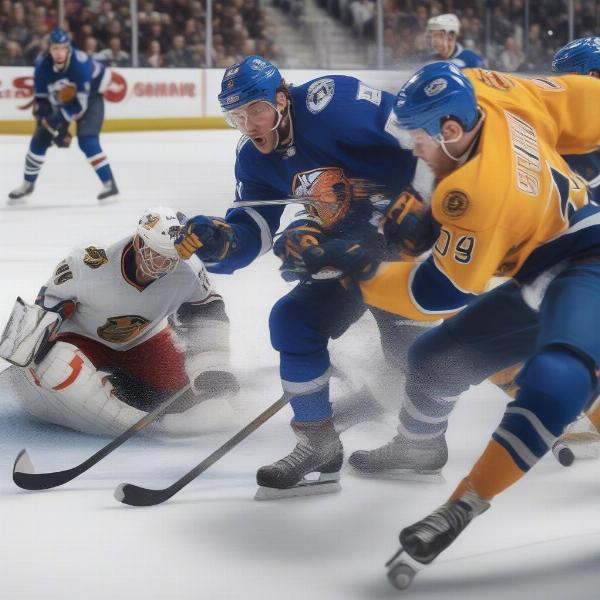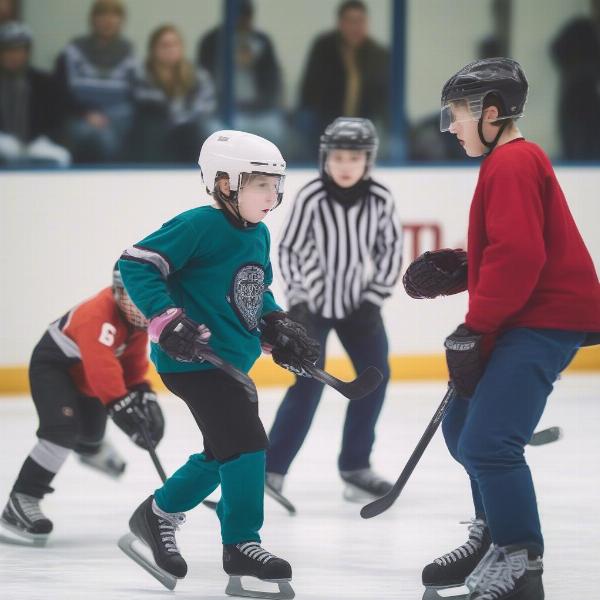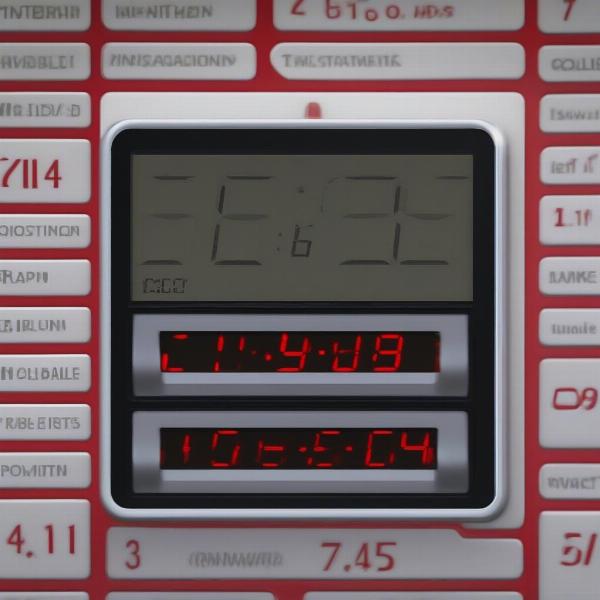Hockey games, known for their fast-paced action and intense physicality, often leave spectators wondering about their duration. So, How Long Are Hockey Games Usually? A standard National Hockey League (NHL) game consists of three 20-minute periods, totaling 60 minutes of regulation play. However, if the score is tied after regulation, the game proceeds to a 5-minute sudden-death overtime period. If a winner isn’t determined in overtime, a shootout follows until a victor emerges.
Breaking Down the Length of a Hockey Game
While 60 minutes represents the official playing time, the actual time elapsed from puck drop to the final buzzer can vary significantly. Several factors contribute to the overall duration of a hockey game:
- Stoppages in Play: Frequent stoppages for penalties, offsides, icing, and face-offs contribute to extending the game’s length. These breaks can range from a few seconds to several minutes, depending on the situation. For instance, a major penalty for fighting results in a 5-minute suspension for the offending player.
- Intermissions: Between each period, there’s a 15-minute intermission, allowing players to rest and strategize while fans enjoy concessions and entertainment. These intermissions add a significant 45 minutes to the overall game time.
- Overtime and Shootouts: As mentioned earlier, tied games extend into a 5-minute sudden-death overtime followed by a shootout if necessary. Overtime can be a thrilling, fast-paced affair, while shootouts add a dramatic element of individual skill. These can add anywhere from a few minutes to close to fifteen minutes depending on the number of rounds necessary in the shootout.
- TV Timeouts: For televised games, commercial breaks are inserted throughout the game, further extending the overall broadcast time. These timeouts, typically lasting around two minutes each, occur multiple times per period. This obviously does not affect the actual time spent in the arena but will increase the viewing time on TV.
- Injuries and Reviews: Player injuries can cause unexpected delays, requiring medical attention and potentially leading to extended stoppages. Similarly, official reviews of goals or penalties can pause the game while referees consult video replays. It’s worth noting that, similar to how long to hockey games usually last, other sports also experience variations in game length due to stoppages and reviews.
How Long Are NHL Hockey Games on Average?
Considering all the factors mentioned above, the average NHL game lasts approximately 2.5 to 3 hours. This encompasses the 60 minutes of regulation play, the 45 minutes of intermissions, and the added time for stoppages, overtime, and potential shootouts. Keep in mind that this is just an average; some games can be shorter or longer depending on the specific circumstances. To learn more about the length of hockey games broadcast on television, you can read our article on how long are hockey games on tv.
 NHL Hockey Game Action Photo
NHL Hockey Game Action Photo
How Long Are Hockey Games at Different Levels?
While NHL games adhere to a standardized format, the length of hockey games can vary at different levels of play:
Youth Hockey
Youth hockey games are typically shorter than professional games, with period lengths adjusted based on the age group. For example, younger age groups might play 10-minute periods, while older youth players may play 12-15 minute periods. Overtime and shootouts may or may not be implemented, depending on the league rules.
College Hockey
College hockey games follow a similar format to the NHL, with three 20-minute periods. However, overtime rules may differ slightly between conferences. Some conferences utilize a 5-minute sudden-death overtime period, while others employ a longer overtime format, such as a 5-on-5 sudden-death period followed by a 3-on-3 sudden-death period. This is similar in length to how long is a professional soccer game, which also has variations in overtime rules.
International Hockey
International hockey games, such as those played in the Olympics or World Championships, also adhere to the three 20-minute period format. Overtime rules can vary depending on the specific tournament regulations.
 Youth Hockey Game Scene
Youth Hockey Game Scene
Why Are Hockey Games Structured This Way?
The structure of hockey games, with its three periods and potential overtime/shootout, is designed to provide a balance between intense gameplay, player safety, and spectator engagement. The relatively short periods allow for high-intensity bursts of activity, while the intermissions provide crucial rest and recovery time for players. The inclusion of overtime and shootouts ensures a definitive winner while adding an element of excitement and drama. For those interested in the concluding times of hockey games, our article on when do hockey games end provides detailed information.
Factors Influencing Game Length Beyond Regulations
Beyond the regulated timeframes, several external factors can influence how long a hockey game actually lasts. Broadcasts, for example, include commercial breaks which lengthen the viewing experience. Similarly, the frequency and duration of penalty reviews can significantly impact overall game time. Understanding these variables helps manage expectations about the true time commitment involved in watching a hockey game. You can find more information about the average duration of a hockey game in our detailed guide: how long does an average hockey game last.
Common Questions About Hockey Game Length
Comparing Hockey Game Length to Other Sports
While hockey games typically last around 2.5 to 3 hours, it’s interesting to compare their duration to other popular sports:
- Basketball: NBA games usually last around 2 to 2.5 hours, including four 12-minute quarters and potential overtime periods.
- Football: NFL games are generally longer, averaging around 3 hours, with four 15-minute quarters and potential overtime.
- Baseball: MLB games have a more variable length, typically lasting between 2.5 and 3.5 hours, with nine innings and no set time limit.
- Soccer: Professional soccer games are generally shorter, with two 45-minute halves and potential overtime periods, totaling around 1.5 to 2 hours.
 Hockey Game Clock Closeup
Hockey Game Clock Closeup
Conclusion
So, how long are hockey games usually? While the regulation playing time is 60 minutes, a typical NHL hockey game lasts between 2.5 and 3 hours due to stoppages, intermissions, and potential overtime/shootouts. Factors such as penalties, injuries, and TV timeouts can further influence the overall duration. Understanding these elements allows fans to fully appreciate the dynamic nature of hockey and plan their viewing experience accordingly. Share this article with fellow hockey enthusiasts to ensure everyone knows how long to expect a hockey game to last!

